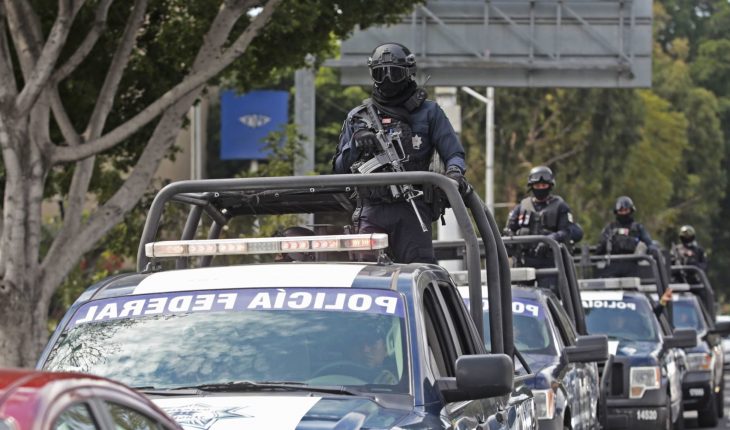In the last year of the government of President Enrique Peña Nieto the Federal Police, under the direction of Armando Navarrete Prida, simulated the hiring of surveillance patrols and the acquisition of spying equipment and social media monitoring in order to justify, legally, the departure of more than 500 million pesos from its budget. Today, the real fate of money is unknown.
You may be interested: In first audit delivery of 2019, ASF leaves out AMLO programs and mega-breaks
The diversions were perpetrated through the signing of contracts to unjustified overprices with potential phantom companies (as a report published by Univision and El País) advanced at the time, but also with the Private Security Corps of the State of Mexico CUSAEM.
This is concluded by various verifications by the Higher Audit of the Federation (ASF) that resulted in the filing of three criminal complaints with the Attorney General’s Office of the Republic (FGR), which initiated the corresponding investigative folders. The purpose of the indegatory is to de-armor responsibilities for criminal proceeding against those responsible, as well as to find out the fate of the money.
Federal authorities presume that this would not only be a possible case of peculating, but also money laundering.
“At the moment there is a clear conviction that a good part, if not all of the resources allocated these contracts, were triangulate to other companies that were not the providers of the services and, in turn, transferred or withdrawn it in cash,” he told Political Animal a federal official with full knowledge of the indeed.
The diverted resources came from a special item called “Public and National Security Expenses” that is intended only for risk, urgent or extreme confidentiality operations. Therefore, the costs acreed from it are allowed to be carried out without following the conventional requirements of the procurement law, such as making public tenders.
Using these reduced controls, those involved assigned contracts to irregular undertakings for services that did not correspond to that heading and to far-flung prices of reality. The reviews identified receipts for possibly fake services and counterfeit signatures.
Contracted ghost companies – presume complaints – would have acted in collusion with officials to simulate the delivery of services or goods that do not exist, or that were already counted on but the purchase was simulated. There are cases where “acquired” equipment was located that have never actually worked.
The authorities warn of a systematic pattern of diversion of resources from the special heading for national security. The new reported cases add to two previous findings: one for the diversion of 1 billion pesos from that heading from the FGR itself and where Tomas Zerón was already ordered to be arrested, and one from the Federal Police with 19 officials involved.
New cases reported
AsF complaints to the FGR identify a possible embezzle life of 1 billion 576 million pesos in the Federal Police in 2018. The amount is the sum of three different cases, two involving possibly phantom companies and one more related to a patrol contracted to the auxiliary police of the state of Mexico.
Read more: Audit reports alleged detours by more than 2,000 mdp in EPN government
For each of these cases, the Prosecutor’s Office initiated an investigative folder against those responsible. The main findings and anomalies reported in each case are detailed below.
Ghost patrols
On April 19, 2018, the Federal Police signed a contract with the Private Security Corps of the State of Mexico CUSAEM amounting to 501 million pesos which was then extended on May 31 for an extra payment of 300 million pesos. In total, there were more than 800 million pesos paid to that auxiliary corporation.
The concept of payments was to carry out an extraordinary patrol support service in 20 locations, 56 infrastructures and 36 monitoring units, among others. That is, the Federal Police hired another auxiliary and state police force to monitor facilities.
This hiring, the ASF notes in its complaint, was from an irregular outset. First because the money was extracted from a item that is for urgent expenses related to national security and not to conventional services. But more importantly, because the Secretariat of the Government itself (where the Federal Police was attached) withalso with a federal security corps that could have been used to do the same and for free.
But the most serious thing is that there is really no evidence – credible – that all those patrols and services were carried out. Despite this, the money was paid even in advance.
“Payments were made for 801 million pesos without having established that the agreed patrol and surveillance services had been provided, since there is no documentary evidence such as logs, supervisory reports, work programme, etc., to prove it. In addition, the total of these services was paid prior to their conclusion and were therefore not accrued,” the ASF said.
What exists, the audit added, are documents in which only the state of force supposedly assigned for patrols and records of the alleged delivery and reception of the service and other offices is indicated, but which lack sustenance in the facts. The current Administration of the National Guard, which assumed the functions of the Federal Police, said there is no documentation on the subject.
Expensive social espionage… and dubious
In 2018 the Federal Police signed a contract with the company Comercializadora Dizoal, S.A. de C.V. for the acquisition of an “Integral Solution of Intelligence of Social Monitoring and Intelligent Location”. The cost of the equipment and software allegedly delivered amounted to 499 million 998 thousand pesos.
What the ASF found after the revision of this contract are irregularities that raise doubts about the purchase of these systems, and which raise suspicions of a simulated acquisition to divert resources.
At the outset, the auditors identified multiple omissions in the selection and contracting of the awarded supplier, to the point where it was not even reviewed if it was aware of the payment of taxes. Nor was the urgent nature of this procurement justified or any reason that merited the use of the national security item for its purchase.
The point is that the contracted provider (in possible collusion with corrupt officials) did not actually provide the service. Dizoal argued to the auditors that the services would actually be provided by an Israeli supplier, of which there is no record of being paid anything.
There is also no record of the entry of goods from abroad or any import order. There is no evidence of receipt in the inventories. The head of the company Comercializadora Dizoal, S.A. de C.V. said that he could not provide further information on his link with the Israeli supplier on the grounds that it was confidential information.
For the operation of the teams, the company said that it subcontracted another company that would take care of the payroll of the employees. But when consulted by the auditors, that company said it was completely unaware of the matter and even showed that its signature does not match that in the records.
A report published in El País y Univision found that Dizoal, like another company with social reason Esrome, which has also now been denounced by the ASF, are actually phantom companies. They were companies created on the same day, before the same notary, and where seniors and low resources are the ones that appear as shareholders.
That’s not all. The auditors found that the system to be acquired through the signing of this contract called OSINT/Atlas has a marking cost not more than 20 million pesos, so it is totally unjustified that almost 500 million have been paid.
Finally, when reviewing what had happened to the money that was paid to Comercializadora Dizoal, S.A. de C.V., what the auditors found on the statements is that this company sent 100% of the resources it received from the Federal Police to other companies that had nothing to do with the hiring.
This leads researchers to presuppote a possible money laundering scheme behind these movements.
Find out: Officials should clarify the spending of 554 thousand mdp following Civil Service audits in 2019
Useless equipment
In 2018 the Federal Police “acquired” for its then intelligence and research divisions three teams and three systems dedicated to the monitoring and intervention of communications by awarding two contracts to the company Servicios Esrome, S.A. de C.V., and for a total amount of about 275 million pesos.
The verification of the audit yielded irregularities very similar to the case of Dizoal: lack of documentation proving that the service was carried out; the transfer of money to companies other than that awarded;companies specialized in Israel; the signing of incomplete or improper contracts, among others.
As in the previous case, Esrome argued that another alleged company had taken care of the payroll of employees who would advise the Federal Police on the use of the acquired technology. This proved false as the designated company denied knowing about the issue, and its signature on the alleged agreement was forged.
As if that weren’t enough, the three teams allegedly acquired in these hires have proved completely useless. One of them never worked while the other two lacked the necessary updates to give them practical utility. Until December 2019, the systems remained useless.
What we do at Animal Politics requires professional journalists, teamwork, dialogue with readers and something very important: independence. You can help us keep going. Be part of the team.
Subscribe to Animal Politics, receive benefits and support free journalism.#YoSoyAnimal
translated from Spanish: Audit reports detours by more than a thousand 500 mdp in federal police
November 20, 2020 |





